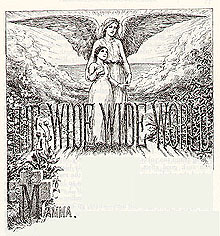 |
lecture notes |
 |
|
|
 |
assignments after midterm
not much gothic today--in U.S. literature a general division of . . .
men writing gothic (located in gothic buildings, gothic forest, or gothic past)
women writing domestic or sentimental romances
divisions less strict now
midterms > midterm samples: Curtis
distribute copies, only changes: more efficient wording, make numbers consistent in directions
Questions now?
Questions likely later . . . email, or email to set up phone conversation or meeting
Office hours next week from 1-8
Questions about schedule?
many responsibilities
but principle of working ahead
a half-hour this week is worth an hour next week
Process . . .
So many things to get right--LITR students don't get bubble tests, multiple-choice, but start with a blank page and have to make something with it--
don't underestimate complexity and sophistication, mental exercise > critical thinking
perfection is elusive
learn to avoid avoidably problems
General Grading Standards
Edit before submitting
4 & 3 first
review research proposals
models
> Curtis
![]()
Romanticism & Enlightenment; Literary styles or periods: (Romanticism and Realism)
after this semester, you'll know Romanticism and when it is, which will give you an anchor for locating other periods.
values of Romanticism compared to periods before and after
started semester with Realism, contrast Romanticism
Realism after Romanticism
What's before Romanticism?
Enlightenment / Age of Reason
Two reasons for knowing this:
How Enlightenment enabled Romanticism
How Romanticism grew from or expanded world of Enlightenment
esp. for women's voices plus or minus values identified with women
Standard value distinction between Enlightenment and Romanticism
Enlightenment emphasizes reason, logic, science, empirical facts > separation of church and state
Romanticism emphasizes imagination, emotion, possibilities > reiintegration of moral values into society (can involve religion more or less)
Gender distinction between Enlightenment and Romanticism
Enlightenment over-represented by male authors, esp. Founding Fathers (less true in Europe, but still somewhat true)
Romanticism continues to be over-represented by male authors, esp. in "classic literature," but women make a new, growing reading audience who determine financial success
Women writers emerge especially in "popular" or "sentimental" styles of fiction and poetry
Women writers sell more books than classic male writers
Classic male writers traditionally supported in schools, with any number of exceptions or resistance
Poe poem
doing next to reinforce distinction between Enlightenment science and Romantic expansion or reclamation of values
Emerson, selections from Nature (1836
19 Empirical science is apt to cloud the sight, and, by the very knowledge of functions and processes, to bereave the student of the manly contemplation of the whole. [cf. 9]
25 Kindle science with the fire of the holiest affections, then will God go forth anew into the creation.
T. E. Hulme on Romanticism as spilt religion
Overall question: How are Romanticism and religion compatible—or not?
+ #3 What values
compatible with or contrary to Romanticism may conversion or evangelism emphasize?
WWW 2.21 clouds, sky > Him who made it [compatibility of
Romanticism & sacred world]
WWW 15.47 want to be a Christian but I am not
WWW 15.79
sublime (following closeness to God)
similarities or compatibilities
emotion, feeling over reason, heart over head
heroic individualism (> child of destiny, "God has a plan for you")
romance narrative as story of conflict, salvation, transcendence (heaven as happily ever after)
romance narrative as desire and loss (+ recovery?)
gothic light/dark as religious color code
evangelical literature personalizes divinity: Jesus as brother, God as parent
childhood innocence & purity < Christian message of "Let the little children come to me," & "You must become as a child"
differences or incompatibilities
spirit & nature
-
Romanticism finds spirit or divinity in nature or Creation.
-
Judeo-Christianity separates God from nature (which is fallen or sinful)--yet some pro-nature attitudes remain.
-
If you've
read John Bunyan's
Pilgrim's Progress
(1678), how does Wide, Wide World resemble it—especially as a
romance?
Conversion not one-time event: struggle continues
Contrast Amazing Grace
Evaluate the
evangelical content of both texts. How to teach such texts in a
public university? What pro's & cons to treating as literature or
history? (e.g., The Second
Great Awakening)
What values contrary to
Romanticism may conversion emphasize?
Heaven v. nature
Fallen world > world of spirit
human nature = good or bad?
-
Romanticism assumes human nature is inherently good but corrupted by civilization; therefore children are innocent and wise compared to adults > sentimentalization of childhood
-
-
Judeo-Christianity assumes human nature is inherently sinful but can be redeemed by instruction, conversion, etc.; children are not innocent, only wayward and ignorant
Somewhere in between:
Byronic hero (Magua, Poe narrators) as satanic but attractive
"Golden Boy" (Uncas)
> "Fair Lady and Dark Lady" (Rowena & Ligeia in Ligeia; Alice & Cora in Mohicans)
Fair Lady and Golden Boy as obedient, devout, pure, untouched or unscarred by experience
Byronic hero and dark lady as rebellious, scarred or tainted by past or experience
Religion fades into background of modern life and literature, but morality and moral symbols remain.
Presentation on pop / classic literature;
Entertain / Instruct
exercise emotions in orderly way
popular literature mostly reinforces where we already are
sentiment / sentimentality
Sentiment & sentimentality:
what reactions to scenes
of tears? everyday life?
power of lost parent, different from Oedipal-male pattern
relational psychology of women, based on mother-daughter connection?
LL 1.2 city of strangers; motherless child
WWW 2.5 deformed child, lost mother
WWW 6.32 uncontrollable weeping
WWW 6.40
Ellen's
off–that's one good thing
Romanticism
LL 1.28
Her little, fierce, untamed, impetuous nature had
hitherto expressed itself only in angry passion, sullen obstinacy, and
hatred. But there were in her soul fountains of warm affection, a depth
of tenderness never yet called out, and a warmth and devotion of nature
that wanted only an object upon which to expend themselves.
LL 2.52 Tears are in TF’s eyes
WWW 5.110 romantic themes of chivalry and honor
WWW 10.23 nature looks friendly
WWW 10.28 rough silverware
WWW 10.35 plunged into the mire
WWW 10.72
I wish there was somebody here that I could love, but there is not.
WWW 11.79-81 Fortune strange to live alone, without help
WWW 11.116-7 pleasant to live in the country > hateful
WWW 15.18 passions always extreme
WWW 15.47 want to be a Christian but I am not
WWW 15.79
sublime (following closeness to God)
Realism
LL 1.11 class difference indicated by language
WWW 5.87 deceptive clerk
LL 2.10 organ-grinder (city detail)
LL 2.49 True from country, moves to city
WWW 1.1, 1.13 lawsuit
WWW 2.53, 2.56 etc—aunt in small country town [extended
family]
WWW 10.97 has to make her own bed
Romance
WWW 5.18 skill and experience necessary for a shopper
WWW 5.29
romance quest
WWW 39.93 Pilgrim’s Progress
WWW 42.1 Pilgrim’s Progress
Lamplighter notes
LL 1.1 Gothic
LL 1.2 city of strangers; motherless child
LL 1.11 class difference indicated by language
LL 1.13 star as transcendent symbol—Romantic as out
there and in here
LL 1.18 league of children against her
LL Mother tried to keep her away from rude herd (class
differences)
LL 1.28
Her little, fierce, untamed, impetuous nature had
hitherto expressed itself only in angry passion, sullen obstinacy, and
hatred. But there were in her soul fountains of warm affection, a depth
of tenderness never yet called out, and a warmth and devotion of nature
that wanted only an object upon which to expend themselves.
LL 2.10 organ-grinder (city detail)
LL 2.11 death of kitten
LL 2.49 True from country, moves to city
LL 2.52 Tears are in TF’s eyes
Wide Wide World
(chapters 1, 2, 5, 6, 10, 15)
Mixing of religion with class, manners, courtship,
nature
![]()
WWW 1.7 the lamplighter
WWW 1.1, 1.13 lawsuit
WWW 1.16 earthly father, heavenly Father
WWW .27 leave me, Mother?
![]()
WWW 2.3 realism ugly city prospect of back walls of houses, with the yards belonging to them, and a bit of narrow street.
WWW 2.4 compassionate nature
WWW 2.5 deformed child, lost mother
WWW 2.21 clouds, sky > Him who made it [compatibility of
Romanticism & sacred world]
WWW 2.42 Dr. Green: wine or novel 52.106
WWW 2.53, 2.56 etc—aunt in small country town [extended
family]
WWW 2.81 country beautiful and healthy
WWW 2.90 correspondence?
WWW 2.94 Captain away
![]()
WWW 5.18 skill and experience necessary for a shopper
WWW 5.29
romance quest
WWW 5.31 [city of strangers]
WWW 5.43 bold, ill-bred
WWW 5.75 gentleman > tears
WWW 5.76 are these your manners?
WWW 5.87 deceptive clerk
WWW 5.99 revenge
WWW 5.110 romantic themes of chivalry and honor
WWW 5.133 black man with a brace of woodcocks [servant?]
WWW 5.139 Sam [another black servant?]
WWW 5.151 dishonorable?
![]()
WWW 6.3 Captain unconscious, incapable of sympathizing
WWW 6.24-5 Mother sympathizes, Ellen x-father
WWW 6.32 uncontrollable weeping
WWW 6.40
Ellen's
off–that's one good thing
![]()
WWW 10.4 how to wash?
WWW 10.5 too busy
WWW 10.18 back to her work
WWW 10.23 nature looks friendly
WWW 10.28 rough silverware
WWW 10.35 plunged into the mire
WWW 10.39 staring up at the moon and stars
WWW 10.56 mocking reprimands
WWW 10.67 correspondence?
WWW 10.72
I wish there was somebody here that I could love, but there is not.
WWW 10.88 You wash! I didn’t think of you doing it!
WWW 10.97 has to make her own bed
WWW 11.2
WWW 11.8 searching stare
WWW 11.14 lives up on the mountain yonder
WWW 11.22 Van Brunt sympathizes with oxen
WWW 11.36 give me a kiss
WWW 11.45 laugh, look, tone stung > prayed
WWW 11.46 resentment not all gone
WWW 11.79-81 Fortune strange to live alone, without help
WWW 11.86 Aunt Fortune’s oxen
WWW 11.92-4 open woodland, beautiful, what?
WWW 11.116-7 pleasant to live in the country > hateful
WWW 12.23 Miss Alice
WWW 12.35 kittens
![]()
WWW 15.15 lover of nature
WWW 15.17 her own heart sadly out of tune
WWW 15.18 passions always extreme
WWW 15.22 water to her eyes again
WWW 15.36
WWW 15.44 meant to be good
WWW 15.47 want to be a Christian but I am not
WWW 5.63 pray together now?
WWW 15.79
sublime (following closeness to God)
WWW 15.82 my father preaches there
WWW 15.98
all
things mend with your own mending
WWW 15.117 well-bred
WWW 16.1 correspondence
WWW 16.5 not forgiven aunt fortune
WWW 16.65 conscience
WWW 16.76 root of evil in her own heart
WWW 16.77 romanticized domestic scene
WWW 16.85 a view
WWW 16.88 picturesque?
WWW 16.91
WWW 16.95 brick walls and paving stones
WWW 16.103 décor
WWW 16.128 hatred of Fortune
WWW 16.138 acknowledge yourself at fault
WWW 16.153 some pride there yet
WWW 16.162 pleasant, neat kitchen
WWW 16.168 think cakes were made without hands?
WWW 16.171 Mamma never kept house
WWW 16.185 my brother Jack
WWW
17.17 literacy
and grammar as class markers
WWW 17.37 (wide wide world—geography)
WWW 17.66 English born
WWW 17.87 say what you mean exactly
WWW 17.117 Fortune display of energy no call for
WWW 17.124 Fortune’s grievance
WWW 17.174 strong passion, strong pride
WWW 39.15 literary talk
WWW 39.26 correspondence b/w scripture and heart
WWW 39.73 a long ladder of knowledge
WWW 39.76 delight + improvement (John)
WWW 39.93 Pilgrim’s Progress
WWW 42.1 Pilgrim’s Progress
WWW 52.23 Byronic?
WWW 52.36 Ellen’s maturity
WWW 52.39 wept
WWW 52.76 grown, not the child
WWW 52.96 correspondence
WWW 52.106 read no novels [cf. Dr. Green in ch 1]
WWW 52.116-118 Van Brunt a Christian
WWW 52.149 manners
WWW 52.161 good came out of evil
WWW 52.169 organic metaphor
evangelical literature
challenge: characters must be redeemed > problem of villains (e.g., Nancy Vawse)
(Stowe solves it by showing Simon Legree and other villains in grips of slavery's lust for economic and sexual power)
challenge: church choirs and evangelical TV/radio "let anybody sing" (talented or not) b/c "the message is good"
How to distinguish quality when the message concerns God's unlimited love and inclusion?
Implicit: secular society is meritocratic--based on merit or "what you bring to the table"
